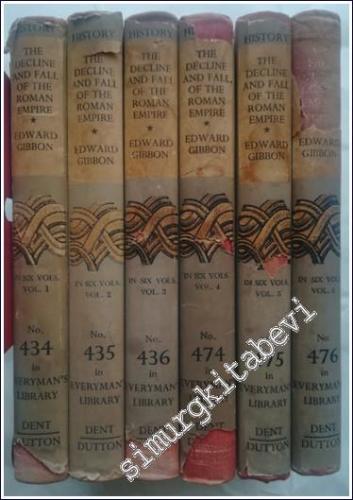#smrgSAHAF The Decline and Fall of the Roman Empire - 6 Volume Set - 1950

The advantage to the student of having a complete con- spectus of Roman History from the foundation of the city in 753 B.C. to the Fall of the Eastern or Byzantine Roman Empire in 1453 A.D. will be obvious to all, and the present work is an attempt to supply such a continuous narrative by dove-tailing into each other the well-known history by Dean Merivale and the monumental work of Edward Gibbon. In pursuance of that plan I have followed the thread of Merivale's story down to the reign of Trajan, where Gibbon begins his Survey of the "Decline and Fall" of the Empire. What is omitted of the former's work is only the concluding 150 pages (chaps. lxvi.-lxxvii.), while Gibbon's History is given in its entirety.
We have, therefore, in this narrative a continuous story of the events transpiring during those years, perhaps the most momentous of any in the world's long record, in their bearing upon the welfare and development of European humanity and in their influence upon the evolution of institutions, civic, political, social, and theological. To one who desires to study such institutions in their inception and gradual growth throughout a long period of time, so as to attempt a com- parative estimate of them with those that have been evolved in modern times, no truer or better standard, all things being considered, can be selected than the "Merivale-Gibbon Con- spectus" now presented to the reader. The judgment of Merivale, characteristically calm and sagacious, always became more cautious and temperate when points were under consi- deration where a wide diversity of opinion prevailed.
On the other hand the author of The Decline and Fall of the Roman Empire possessed a mind of infinitely greater compass and comprehensiveness than that of Merivale. His generalisa- tions were vast and far-reaching, while his power of detect- ing subtle analogies between characters, circumstances, and things was only excelled by that of De Quincey. He had not, however, that art of calm impartial survey which dis- tinguished Merivale's presentation of an antagonist's case....
The advantage to the student of having a complete con- spectus of Roman History from the foundation of the city in 753 B.C. to the Fall of the Eastern or Byzantine Roman Empire in 1453 A.D. will be obvious to all, and the present work is an attempt to supply such a continuous narrative by dove-tailing into each other the well-known history by Dean Merivale and the monumental work of Edward Gibbon. In pursuance of that plan I have followed the thread of Merivale's story down to the reign of Trajan, where Gibbon begins his Survey of the "Decline and Fall" of the Empire. What is omitted of the former's work is only the concluding 150 pages (chaps. lxvi.-lxxvii.), while Gibbon's History is given in its entirety.
We have, therefore, in this narrative a continuous story of the events transpiring during those years, perhaps the most momentous of any in the world's long record, in their bearing upon the welfare and development of European humanity and in their influence upon the evolution of institutions, civic, political, social, and theological. To one who desires to study such institutions in their inception and gradual growth throughout a long period of time, so as to attempt a com- parative estimate of them with those that have been evolved in modern times, no truer or better standard, all things being considered, can be selected than the "Merivale-Gibbon Con- spectus" now presented to the reader. The judgment of Merivale, characteristically calm and sagacious, always became more cautious and temperate when points were under consi- deration where a wide diversity of opinion prevailed.
On the other hand the author of The Decline and Fall of the Roman Empire possessed a mind of infinitely greater compass and comprehensiveness than that of Merivale. His generalisa- tions were vast and far-reaching, while his power of detect- ing subtle analogies between characters, circumstances, and things was only excelled by that of De Quincey. He had not, however, that art of calm impartial survey which dis- tinguished Merivale's presentation of an antagonist's case....






















